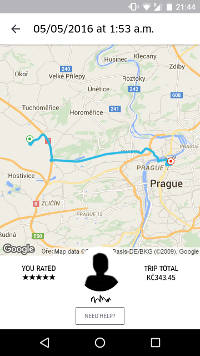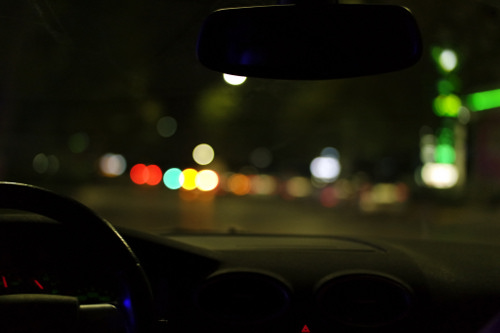In which we are tailed through the dark streets of Prague while using a billion dollar app

At 2 in the morning, having just met a friend arriving in Prague airport, getting back home was the first priority. This was to be her first ride at the pleasure of Uber Technologies Inc., ordered on my phone with the touch of a button. This was an UberPop — their lower cost offering, available in many cities, including the capital of the Czech Republic. All the convenience and cost saving without the black paint.
The company, along with the similarly disruptive Airbnb, has undergone massive success while challenging established interests in the form of existing operators and laws. Compliance with city and national laws is a complicated patchwork spanning different classes of cars across many localities, all with different legal systems and precedents. But what distinguishes these "sharing economy" apps from historic enterprises in comparable legal situations is that they are positioned as platforms: practically, in many cases legally, and in the minds of users. And the person in the front seat, just like the person sleeping in the master bedroom, are just another sort of user.

With seamless user experience we were guided to a certain pick-up area outside Václav Havel Airport, where we loaded the luggage in the rear of the waiting car and climbed into the back seat. Driving through Prague at night is beautiful, and one has the sense of being in an old European film. The interplay between dark and light, the repeating patterns of building and empty space, the way the Czech driver glances in the rear-view mirror.
"That taxi driver is following us," he said, eyes fixed and visible in the glass, "he's following us because I'm Uber... They don't like Uber."
Our turns became more abrupt as we drove yet again under the same bridge near our hotel, and it was difficult not to feel slightly apprehensive. "He has camera! You see?" The taxi driver (an excellent tail) had a cell phone on his dashboard, trying to secure evidence that our driver was operating as a commercial chauffeur, rather than being our friend or distant Czech relative. As the situation went on without obvious conclusion, I began to suggest ideas like us stopping outside a bar and going in together acting like old friends, but English communication failed us.
Eventually he accepted defeat and we were dropped outside our hotel. We politely declined the driver's suggestion to keep the luggage and return in ten minutes, and headed inside with our stuff, threatened by the taxi driver now outside the car with phone in hand.
The legality of drivers working with Uber didn't even occur to me when I opened the app, and is not clear now. There are some great arguments against the new commercialized sharing economy, but it certainly felt, in the early hours of that morning, like we and the driver had consented to an amicable free exchange, mediated through a fantastic app, and with no significant externalities, only to be attacked by entrenched current interest.
The driver had requested I submit a help request to Uber through the app to explain the situation. Uber gave us a free ride in Prague — something I don't envision using any time soon.


